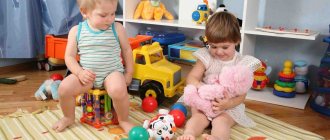Birth is the decisive and final process in the stage of intrauterine development; this is the moment when one period ends and passes into another, longer and more entertaining one. The baby grows and gets stronger, he becomes interested in what is happening around him, he learns about prohibitions, the first character traits appear and attempts to defend his own - and we are talking about the crisis of 1 year. One of the very important crises in the development of a child.
During this period, parents will face a difficult time: of course, a lot depends on the child’s temperament; for some, the crisis will pass much calmer, but the fact that for everyone during this period the issues of establishing house rules, boundaries and the issue of safety will be relevant - this is an indisputable fact. It is the crisis of 1 year that will be discussed in this article: what exactly happens to a child in a year, why this is a “crisis” and what happens to parents during this period.
A crisis is a natural process, but everyone experiences it differently. It may begin earlier than a year, and for some - a year or later, but almost everyone goes through it.
During the first year, the child goes through a colossal path in development: from a tiny person who could not even turn on his side without the help of his mother, the baby turns into a very smart and often running toddler. The child can already do a lot on his own; he can crawl, walk or reach places of interest to him; All the bedside tables, cabinets, wires and shelves have become closer and more accessible than ever before, and the desire to know and explore what is happening around is growing incredibly. It is at this time that the child first learns the words “impossible,” “no,” “dangerous,” and their meanings. Of course, he doesn’t understand this, doesn’t like it and causes protest! At this time, the first whims begin, the goal of which is to achieve their goal. Very important advice for getting through the 1st year crisis: stick to your original decision and act together with your partner. If you forbid something, then go to the end, otherwise the child may form an “understanding” that by crying, screaming or in any other convenient way he can get his way. The crisis will pass, but the whims and the way to interact will remain.
Why does the One Year Crisis occur?
Your baby is growing and learning something new every day. By one year he is already so old that you are surprised to remember how small and defenseless he was when he was born. Now he walks, or at least tries, understands what adults say and tries to speak on his own.
Every day the world opens up to him more and more. Along with new knowledge about the world, his emotional perception becomes more complex, he needs more movement and impressions. The child persistently demands communication and becomes very emotional. The main thing is to be patient and remain calm. No harmful fly has bitten your baby. He just grew up, and he began to have a one-year crisis - the transition period between infancy and early childhood. However, this period can be lived without obvious crisis manifestations if you provide the baby with enough attention and opportunities for movement and development. In the context of this topic, we recommend that you familiarize yourself with the material on development and toys
Let us list the main processes that occur with the baby by 12 months:
- Becoming a walk. At approximately 8–14 months, children begin to walk independently, which in itself greatly influences the child’s development, because this new skill gives him the opportunity to explore the world around him even more deeply.
- Speech development. During this same period, speech actively develops. But the language of a one-year-old child is not similar to the language of adults. The words he utters are different from those we are used to, and the baby puts into each one a special meaning, and sometimes several. The meaning of a word depends on the situation in which it is pronounced. A child’s thinking at this age is not independent. If adults can use words to describe their thoughts, experiences or memories, then a child needs them in order to describe what he sees at a given moment in time. He cannot yet talk about missing objects. This phenomenon is called “autonomous speech”. With its help, the child makes statements, but does not make conclusions. At the same time, the baby already understands the words of “adult speech”.
- Confronting adults. At this stage, separation from the mother occurs. The child begins to oppose himself to others. The baby refuses to fulfill the parents’ requests (primarily if he feels a lack of their attention), sometimes seeming to return to an earlier period in behavior.
Some skills acquired by a child before one year of age may disappear for a while. For example, having already learned to walk, the baby begins to crawl again. This happens because the ability to walk has not yet fully developed, and at the moment the emphasis in development has shifted to something else, for example, to logical thinking.
The child experiences a contradiction between his own needs and capabilities: he strives to do everything himself, but he does not always succeed. He wants to say something, but he can’t find the words, he wants to reach it, but he can’t reach it. These contradictions are not only the driving force of his mental and general development, but also the cause of aggression and emotional outbursts.
The one-year crisis can last from one week to several months until the child’s period of autonomous speech ends.
How to help yourself in this condition?
Rest more
Don’t be shy to ask for help, involve relatives in caring for your child or hire a nanny. Spending a little money on a house helper at least once a week will greatly ease your condition.
Set your priorities correctly: rest comes first, and only then cleaning.
Change your environment more often - meet friends, go shopping.
Of course, the baby still requires a lot of attention, but after 5-6 months he is already able to do without breast milk for some time, so it is quite possible to leave him with one of the helpers.
Give up perfectionism
I really want to be like the moms on Instagram: for the house to sparkle with cleanliness, for the child to calmly pose for a photo, and for the husband to glow with happiness. No need to be torn to pieces. Being a mother of a baby is a very big burden. Set yourself the minimum that will allow you to think of yourself as a fairly good mother, a caring wife and a good housewife. Do you have dumplings for dinner? Is the child fed and calm? Your minimum for today has been met.
Contact a psychologist
All the talk about how it used to be much harder for women, but they managed, devalues your feelings. If you cannot cope with fatigue and apathy, you begin to feel hostility towards your own child - it’s time to contact a specialist. There is nothing shameful or strange about this. Remember that thousands of women are going through the same experiences as you.
In the modern world, a mother spends most of her time alone with her child. In the time of our great-grandmothers, “when they gave birth in the field and nothing,” the education system was completely different. Physically, the work was objectively harder, but there were much fewer demands on the mother. You have the right to get tired even with one child and ask for help. Remember the main thing: children grow very quickly. Very soon he will stop putting everything in his mouth, learn to talk, and then tie his shoelaces. And one more thing: any crisis (unless, of course, it is a real depression) is a leap in development. For your child - a step towards independence, acquisition of new skills, and for you - an important idea that time and attention for yourself are important components of happy motherhood.
What happens to the child during this period
Characteristic signs of a crisis of one year:
- Independence;
- Uncontrollability;
- Stubbornness;
- Disobedience;
- Demanding attention to oneself;
- Sensitivity to comments;
- Grievances;
- Aggression;
- Moodiness;
- Conflicting behavior.
Now the child is able to act under the influence not only of events that are happening now, but also of ideas and images emerging in memory.
At this time, the child experiences a certain leap in development. Deep psychological transformations take place within him. He begins to feel like an individual and wants to be independent. The little person develops his own desires, which no longer depend on adults. He strives to explore the world on his own - to touch everything, taste it, see what's inside. And any prohibitions cause a wave of disobedience in him.
Sources
- Wagner R., Meißner J., Grabski E., Sun Y., Vieths S., Hildt E. Regulatory concepts to guide and promote the accelerated but safe clinical development and licensing of COVID-19 vaccines in Europe. // Allergy - 2021 - Vol - NNULL - p.; PMID:33887070
- Al-Tammemi AB., Tarhini Z., Akour A. A swaying between successive pandemic waves and pandemic fatigue: Where does Jordan stand? // Ann Med Surg (Lond) - 2021 - Vol65 - NNULL - p.102298; PMID:33880181
- Koweyes J., Salloum T., Haidar S., Merhi G., Tokajian S. COVID-19 Pandemic in Lebanon: One Year Later, What Have We Learned? // mSystems - 2021 - Vol6 - N2 - p.; PMID:33879497
- Przednowek T., Stacey C., Baird K., Nolan R., Kellar J., Corser W.D. Implementation of a Rapid Post-Code Debrief Quality Improvement Project in a Community Emergency Department Setting. // Spartan Med Res J - 2021 - Vol6 - N1 - p.21376; PMID:33870002
- Desilets J., Lee CS., Fang W., Hinkle DM. Mortality risk associated with endophthalmitis in West Virginia. // Int Ophthalmol - 2021 - Vol - NNULL - p.; PMID:33861381
- Monte-Soldado A., López-Masramon B., Rivas-Nicolls D., Andrés-Collado A., Aguilera-Sáez J., Serracanta J., Barret JP. Changes in the epidemiologic profile of burn patients during the lockdown in Catalonia (Spain): A warning call to strengthen prevention strategies in our community. // Burns - 2021 - Vol - NNULL - p.; PMID:33858713
- Eubank JM., Burt KG., Orazem J. Examining the psychometric properties of a refined perceived stress scale during the COVID-19 pandemic. // J Prev Interv Community - 2021 - Vol - NNULL - p.1-14; PMID:33855930
- Ghosh AK., Mecklenburg M., Ibrahim S., Daniel P. Health Care Needs in the Aftermath of Hurricane Maria in Puerto Rico: A Perspective from Federal Medical Shelter Manatí. // Prehosp Disaster Med - 2021 - Vol36 - N3 - p.260-264; PMID:33853696
- Wang R., Zhong R., Liang H., Zhang T., Zhou X., Huo Z., Feng Y., Wang Q., Li J., Xiong S., Li F., Liang W., He J Thoracic surgery and COVID-19: changes and managements during the pandemic. // J Thorac Dis - 2021 - Vol13 - N3 - p.1507-1516; PMID:33841943
- Ogura Y., Gum JL., Steele P., Crawford CH., Djurasovic M., Owens RK., Laratta J., Brown M., Daniels C., Dimar JR., Glassman SD., Carreon LY. Drivers of in-hospital opioid consumption in patients undergoing lumbar fusion surgery. // J Spine Surg - 2021 - Vol7 - N1 - p.19-25; PMID:33834124
What parents shouldn't do
Many parents worry, not understanding how best to behave with a capricious baby. There is no need to worry - you just need to get through this difficult period, trying to make it as painless as possible for you and for the child. It is important to understand that everything that happens to him is normal. What not to do:
- Blame yourself if the child cries or is naughty;
- Listen to relatives saying that you spoiled him;
- Yell at the baby, show him your negative reaction and spank him - he still won’t understand why;
- Scolding him for broken toys and painted walls is how he learns about the world;
- Ban him from everything. Remember that every prohibition is stress for a child, and all his disobedient behavior and throwing toys away is a way to learn about the world. In a dangerous situation, calmly explain to him why he should not do this;
- Use the word “cannot” too often. Save it for when your child actually does something wrong (like spilling sugar on the table). And in critical situations, use the word “dangerous”;
- To prevent your child from being independent - support him if he strives to do everything himself;
- Go to extremes, reacting to all his whims and fulfilling all his desires - look for ways to distract or persuade the child;
- Behave unworthily or incorrectly in the presence of a baby - children at this age copy everything;
- Showing your child that you are dominant because you are an adult should help him see you as his friend;
- Ignore the baby.
Main symptoms
Age-related developmental crises are characterized by certain symptoms.
1 year:
- loud crying without tears;
- sudden movements: waving their arms, stomping their feet, shaking their heads, swinging to strike;
- excessively lively facial expressions: frowning eyebrows, pursing lips tightly, narrowing eyes;
- demanding intonations;
- dangerous curiosity when drawn to everything forbidden;
- restlessness;
- protests against the actions of adults (tearing off clothes) and the usual routine (refusing to eat);
- importunity.
3 years:
- negativism;
- obstinacy;
- stubbornness;
- riot;
- despotism;
- depreciation;
- self-will.
In addition to the above “seven stars”:
- distance from parents;
- pathological, inexplicable greed;
- harmfulness;
- jealousy;
- unreasonable aggression: they can bite, scratch, fight.
7 years:
- do not obey;
- they want to be adults: they imitate someone older, refuse to play with those who are younger;
- do not accept criticism;
- deliberately offend others.
Teenage crisis:
- hostility, conflict;
- gross violations of discipline, rules, prohibitions;
- desire for loneliness and isolation, replacement of real communication with virtual communication;
- hot temper, impulsiveness;
- decline in school performance;
- increased sensitivity to criticism.
There are also common points for all age leaps: disobedience, protests and even riots against boundaries and restrictions, closedness, loss of authority of adults and trust in them, sudden changes in mood, irritability, aggression.
What parents need to do
- Try to maintain your usual daily routine.
- Create the richest possible developmental environment in the home. Train him. Let him touch different surfaces, smell smells, listen to sounds. Show how to use different objects.
- Support your baby in everything.
- Set only a good example for your child.
- Give him simple instructions so that the baby feels responsible and independent.
- Coordinate the upbringing model with other relatives so that there is no conflicting behavior between different family members, when one prohibits and the other allows.
To avoid unnecessary conflicts, put away items that the child should not touch.
- Organize your child’s personal space where he will feel in charge.
- Try to understand all the baby’s requests; if you understand, voice them. For example: “Oh, do you want to get a toy?” - and even: “Do you want to touch the fire?” Then you can explain why this should not be done. It is important that unresolved situations do not arise.
- Do not be afraid that the child will bump, hurt or burn himself, of course, if we are not talking about a serious wound. A little person mastering the surrounding reality must necessarily go through some tests in order to learn to act safely in our difficult world.
- Respect the child's personality and demonstrate your respect. This will help him grow up to be a strong and confident person.
- Show unconditional love for your baby. Hug and kiss him often.
- If you need to leave the house, talk about it. Explain that you will be back soon.
- If a child does not listen to you and continues to commit some unacceptable actions, it is important to clearly build a system of rules and prohibitions. Don't force anything. Figure out how to distract or engage him. For example, if your baby refuses a certain food, offer to eat it with toys.
- Before going to the toilet, get your child interested in something, otherwise he will definitely be upset because of your absence. In this case, talk to him from behind the door, explain that you will be leaving soon.
- If a child asks for help, help, but do not overdo it. Let the baby try to cope on his own, and you will “insure” him in that part of the matter that he is not yet able to do.
- If your baby requires attention, give him time. And if you don't have one at all, distract him with something interesting.
We hope these tips will help you establish constructive communication with your baby. Let this period not be a crisis for you, but an exciting “quest” that will teach you endurance and wisdom, and help your child become more mature.
Article on our Yandex Zen channel
Periodization
In psychology, there are usually five childhood crises by age:
- 1 year - transition from infancy to early childhood;
- 3 years - transition to preschool age;
- 7 years - mastering school;
- 13 years - adolescence;
- 17 years old is the beginning of early adolescence.
However, this periodization is quite arbitrary. In the works of psychologists, textbooks, and various sources one can find other interpretations of it.
For example, there is an opinion that a separate newborn crisis should include the entire first year of a baby’s life, from birth to standing. In fact, every week there can be called a transition period, characterized by sharp jumps in physical condition.
According to another point of view, the crisis periods of 13 and 17 years should be combined into one - adolescence.
In some sources, the crisis of early adolescence is excluded from this periodization, since a seventeen-year-old person can hardly be called a child in the general sense of the word.
Such discrepancies in periodization should not be scary. Their descriptions are as similar as possible.
My recommendations
New developments of the psyche on the threshold of new stages of ontogenesis are associated with crises. This is fine. Parents need to be patient: it will take a little time and everything will get better.
You should not scold your child for negative behavioral reactions during a crisis. Psychological practice shows that this is ineffective. An alternative to this is confidential communication, explaining to the child the essence of emotional states. The baby calms down when he sees that his mother understands his feelings and shares them.
Those children whose parents encourage their independence overcome crises more easily. Starting with independence in dressing and washing, parents gradually develop in the child self-confidence, initiative and a love of order.
If the parents’ views on upbringing coincide, and the spouses are calm about the crisis, then its course will be painless for the family.











